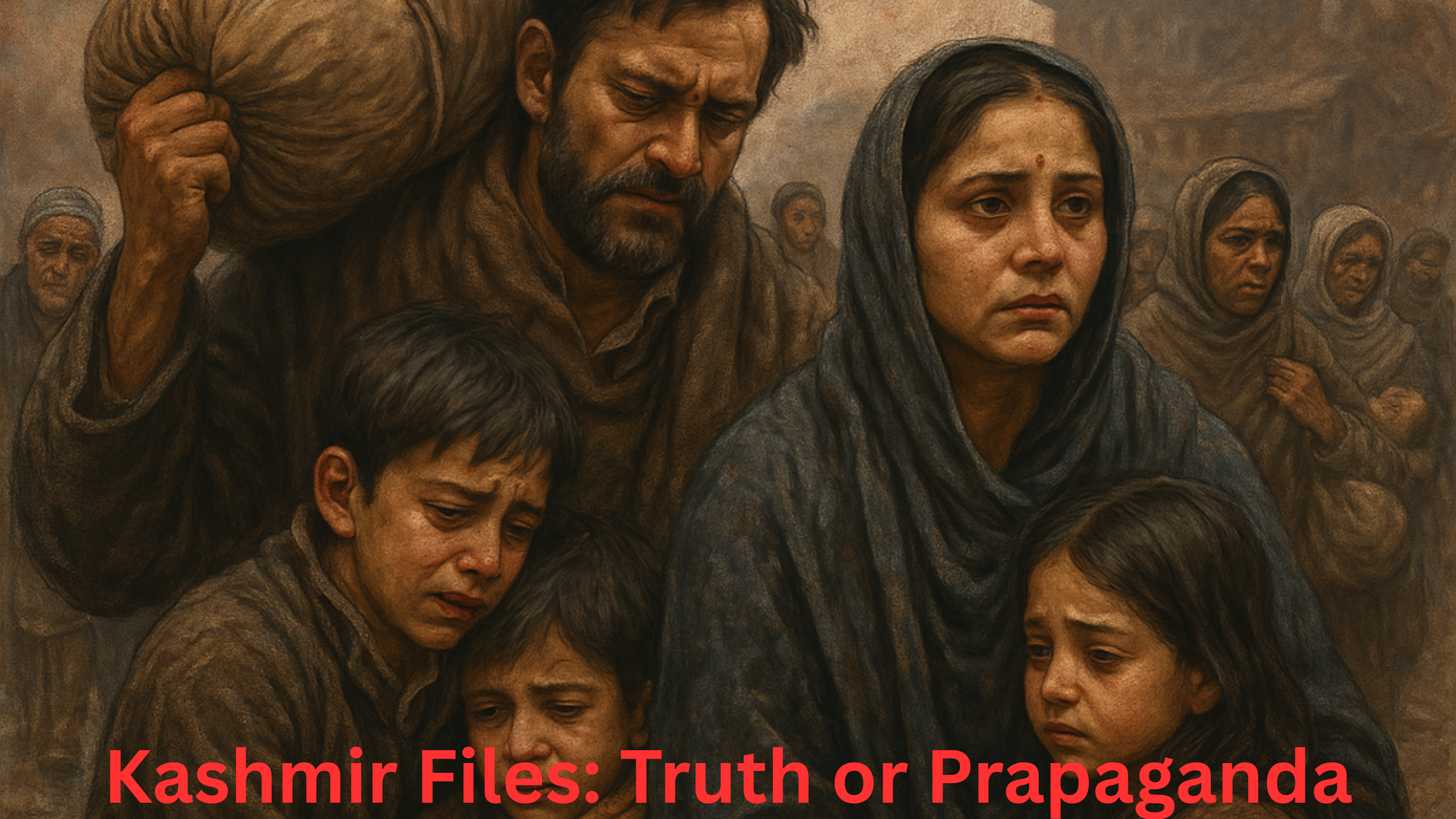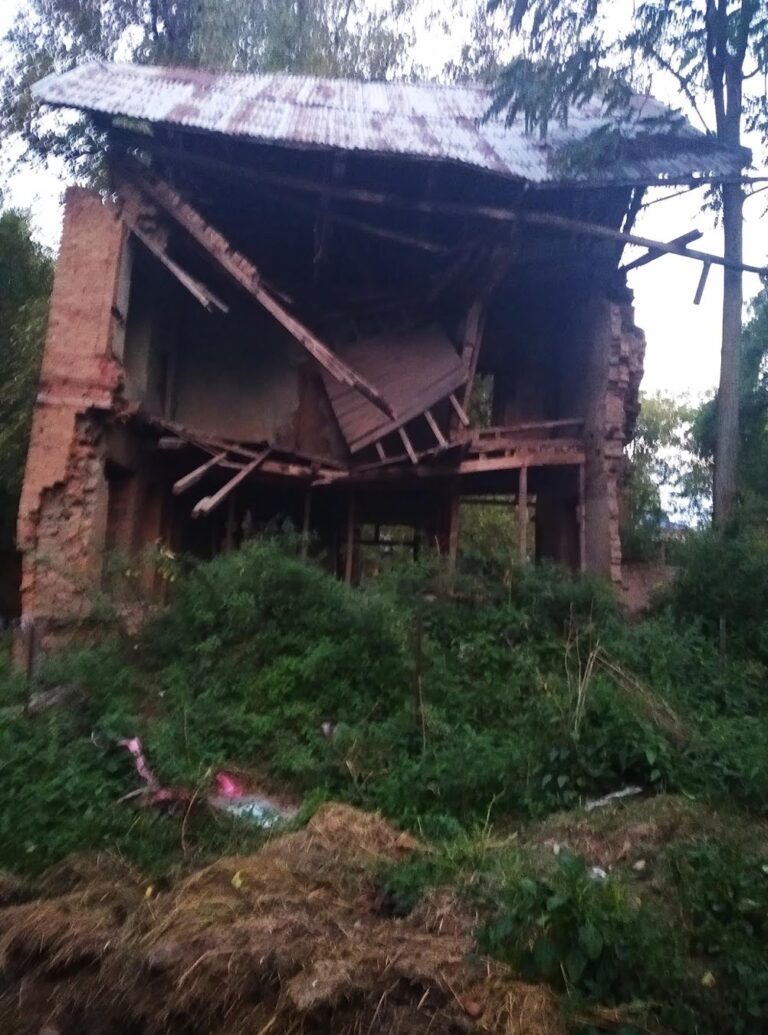The Kashmir Files Movie: Truth or Propaganda?
After the release of the movie “The Kashmir Files”, a major debate emerged regarding the Kashmiri Pandit Exodus. Some people consider the film as an eye-opener that reveals hidden truths, while others call it propaganda with a biased agenda.
So, what is the reality!

The Exodus of Kashmiri Pandits: A Historical Reality
During 1989-90, Jammu & Kashmir witnessed a rise in Islamist extremism and separatist movements. Kashmiri Pandits faced killings, threats, and slogans like “Raliv, Tchaliv, ya Galiv” (Convert, Leave, or Die). As a result, hundreds of thousands of Kashmir Pandits were forced to leave their homeland. This is a well-documented historical fact.
Did the Movie ‘The Kashmir Files’ Tell the Whole Story?
People who liked the film said it finally told the stories that newspapers and history books ignored. But the people who didn’t like it said it only showed certain things and left out important parts. They thought it had a political reason for telling the story that way.
But here’s what no one can argue with: the Kashmiri Pandits leaving their homes was a truly awful thing, a real tragedy. To say it was just propaganda would be unfair
Here is Why the Film ‘The Kashmir Files” Took the approach
The movie was intended to document the plight and genocide of Kashmiri Pandits, not to create a political, diluted version of events.
Before this movie, media and movies often showed Kashmiri Pandits leaving as just one part of a bigger fight. They didn’t talk about how Terrorists forced them to leave because of their religion.
The Media did not talk enough about how the Pandits were targeted and forced out because of who they were.
The movie wanted to change that. It wanted to tell their story in a raw, powerful way, without the usual “we’re not biased” stuff that the media uses, which had nothing to do with the pain the Pandits went through.
Since the film was not a documentary analysing the root causes of terrorism in Kashmir or the reasons behind local support for terrorists, it focused solely on the plight of Kashmiri Pandits.
While it is true that Muslims also suffered, as seen in incidents like the Gowkadal Massacre, where hundreds of Kashmiri Muslims were killed. The crucial distinction is that Kashmiri Pandits were never involved in the killings of innocent human beings.
Returning to the main question: Is The Kashmir Files based on a true story?
The answer is yes. But it only shows a small part of all the terrible things that were done to the Kashmiri Pandits.
For example, the movie showed how Girija Tickoo was raped and killed. But it didn’t show other horrible cases, like what happened to Sarla Bhat and Prana Ganjoo. Both Innocent women were raped and killed by terrorists.
It showed the Nadimarg Massacre, but it didn’t show other massacres where Pandits were killed, like the Wandhama Massacre and the Sangrampura Massacre
Also, innocent Sikhs were killed by terrorists in the Chittisinghpura massacre, where more than 35 Sikh brothers died. So, the truth is, everyone – all the different groups of people – went through pain.
But if the movie had tried to tell everyone’s story, it would have taken away from its main point: to show why the Kashmiri Pandits were forced to leave their own land.
Does this omission make the film propaganda?
Absolutely not.
Given the constraints of a three-hour runtime, it was impossible to depict every incident. Instead, the film focused on capturing the key events that led to the mass exodus of Kashmiri Pandits.
Balancing these narratives within the film would have diluted its core purpose—to highlight the specific events that led to the forced migration of Kashmiri Pandits from their own homeland.
The movie was not meant to be a broad analysis of the Kashmir conflict. The movie was a focused portrayal of a community that was displaced. The community left to live in deplorable conditions, and received minimal support from the government. For three decades, people didn’t hear their story or didn’t hear enough. So, it was very important to tell their sad story clearly and directly.
The Emotional Weight: Why Does This Film Hit So Hard?
Few films manage to leave an audience speechless, but The Kashmiri Files does exactly that. Why? Because it taps into collective memory and suppresses grief. Many Kashmiri Pandits have spoken about how watching the film felt like reliving their trauma—an emotional validation they had long been denied.
The Impact: What Comes Next?
The Kashmiri Files has reopened old wounds, but will it lead to any meaningful action? Will it encourage justice, reconciliation, or even a deeper examination of history?
The film’s success at the box office and its reception on global platforms prove that there is an audience eager to engage with such narratives. However, the real test lies in what follows. Will there be more discussions, policy changes, or efforts towards the rehabilitation of Kashmiri Pandits? Or will it remain another film that stirs emotions only to fade into cinematic history?
Perhaps the most important takeaway from The Kashmiri Files is not just the past it portrays but the questions it raises about the present and future. How do we ensure that history is remembered accurately? How do we use cinema as a tool for understanding rather than just division?
Conclusion: A Film That Demands Reflection
No matter which side of the debate you stand on, The Kashmir Files is a film that refuses to be ignored. It forces us to confront an uncomfortable past and ask ourselves: Is this just another movie, or is it a call to remember, acknowledge, and, perhaps, heal?
The real propaganda is not the film itself but the empty promises made by political parties over the decades. Kashmiri Pandits remain displaced, their suffering ongoing, simply because they do not form a decisive vote bank.
While governments have come and gone, Kashmiri Pandits’ plight has remained unchanged. The true tragedy is not just what happened in 1990 but the continued apathy toward those who lost everything.
For Detail studies Read





